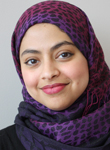Grad student may have found 'missing link' of meiosis
By Stacey Shackford

It’s been dubbed the holy grail of meiosis – the missing link that connects DNA repair, replication and recombination – and Najla Al-Sweel believes she may have found it. The generosity of Cornell alumni will help further investigate her discovery and share it with the world.
A Ph.D. candidate in the lab of molecular biology and genetics professor Eric Alani, Al-Sweel studies the role of a protein, Mlh3, in maintaining the “genomic integrity” of cells.
The protein serves a dual role: performing quality control of the cell’s DNA as it replicates and making repairs if necessary; and facilitating communication among sections of overlapping chromosomes that are exchanging vital information during the “crossing over” phase of meiosis cell division. If that communication goes awry, the chromosomal sections cannot be cut apart, which can lead to genetic abnormalities that cause spontaneous miscarriages and birth defects.
“We don’t fully understand the underlying mechanisms and how these steps are happening,” Al-Sweel says. “It’s like a choreographed dance, and each player has a role. The protein connected to crossing over is unknown, but we now have evidence that it is Mlh3.”
While making mutations of the protein and studying how the changes affected both of its functions, Al-Sweel found domains that appeared to be specialized for meiosis only.
“It was really exciting. Now I can begin to look at how those areas work during meiosis,” Al-Sweel says.
It is not her only quest. Al-Sweel also is dedicated to creating better opportunities for women in science and bridging scientific communities in the United States and the Middle East.
Al-Sweel grew up in Virginia but attended high school and college in Saudi Arabia, where marriage between first cousins is common; so are birth defects, and it piqued Al-Sweel’s interest in genetics.
The culture of Saudi Arabia led her to become a scientist. Now the culture of science has led her back to Saudi Arabia.
“When I got into science, I began to see the disparities that exist between men and women, especially in the Middle East,” she says. “These ladies are smart. They really have something to offer, and that should not be taken away. It’s not much better here in the United States. Female scientists have some advantages, but there is still a lot of disparity. I think it’s my job to do something about it.”
There is a great need for female professors in Saudi Arabia, where higher education is segregated by gender. Al-Sweel plans to become a professor there, while also keeping one foot in the United States – possibly through an adjunct faculty position – so she can continue to be exposed to techniques and technologies at the cutting edge of science.
“I can be a scientific bridge between the U.S. and the Middle East,” Al-Sweel says.
A recent $20,000 award will help her do that. Established in 2011 by Tom ’64 and Diann ’66 Mann and Cornell parents Jeanne and Gary Newman, the Harry and Samuel Mann Outstanding Graduate Student Award was conceived by cousins Tom and Jeanne to honor their fathers, Harry and Samuel Mann, the sons of Russian immigrants who were early innovators in the production of penicillin and the sale of research biochemicals.
“Najla’s work is the embodiment of the award’s mission: to help people achieve their dreams and bring the people of all nations together to improve their welfare through the life sciences,” Tom Mann said.
Stacey Shackford is a staff writer for the College of Agriculture and Life Sciences.
Media Contact
Get Cornell news delivered right to your inbox.
Subscribe